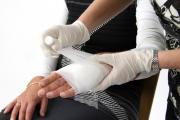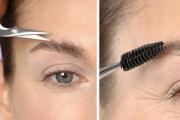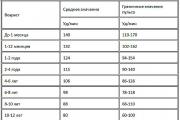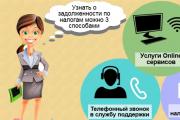How to lower your heart rate at home quickly and effectively
Article publication date: 06/08/2017
Article last updated: 12/21/2018
From this article you will learn: how to reduce the pulse at home, using the techniques worked out over the years. Methods for quickly reducing the pulse with special physical and breathing exercises and other non-drug methods.
Most common places to measure heart ratePhysical ways to reduce the pulse (fast)
To reduce your heart rate during stressful situations, sit or lie down and try to relax. The situation will return to normal very soon.
You can also provoke a gag reflex by inserting fingers into the mouth and irritating the root of the tongue.
Breathing exercises to lower your heart rate
How can you lower your heart rate at home quickly:
- Squat down sharply, lower your head between your legs and cough. This technique, although approved in medical practice, still requires confirmation of the possibility of application in each case individually.
- Try to calm down and slow down your breathing. Sometimes this exercise reduces the heart rate.
- Try using the asymmetrical breathing technique, which involves inhaling for 2 seconds and exhaling for 4.
- Hold your breath for 5 seconds and strain. Repeat the exercise 5-7 times. It changes the pressure in the large blood vessels in the chest, which will slow the heart rate.
- Perform a sniper drill. Inhale deeply through your nose, hold your breath for 10 seconds, and exhale slowly through your mouth. Usually after 5 repetitions, the condition returns to normal. With frequent use of this practice, the heart rate may return to the equilibrium value after the first exercise.
- Sing loudly. The rhythm of breathing performed to music can reduce the frequency of your heart muscle. In the 2-3 minutes that the song lasts, the heart rate will return to acceptable limits.
Water procedures
Wash your face with cold water or dip your face in a container of cold water and hold for a few seconds. This method stimulates the vagus nerve and activates the metabolic slowdown reflex in the body.
A simple cold shower can help lower your heart rate. The principle of action is based on the narrowing of blood vessels, which will lead the heart to a "lowered mode".
Non-drug means to reduce heart rate
Calming the nervous system
How to lower the pulse at home without using medication? You can drink a herbal infusion of two parts of motherwort and one part of valerian. Taking this herbal infusion will slow down the pulse.
The same reduction can be achieved by taking herbal decoctions or infusions:
- chamomile flowers;
- lime color;
- passion flower (passiflora);
- skullcap.
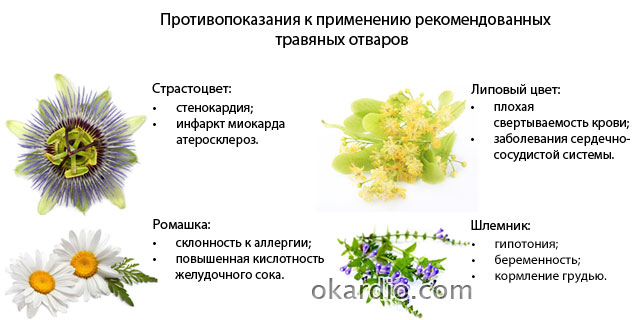 Click on photo to enlarge
Click on photo to enlarge Also, taking sedative medications will lead to calming and heart rhythm.
The influence of sharp and loud sounds can increase heart rate by 13 bpm. Therefore, you should avoid being in places with high noise levels.
Massage
Regular body massage can lower your resting heart rate. According to research conducted by physiotherapists, periodic relaxation massage reduces the production of adrenaline, norepinephrine and epinephrine - hormones responsible for stress levels.
Regular massage can reduce resting heart rate by 8-10 beats per minute.
Tanning and artificial tanning
Sun exposure twice a week or tanning in a tanning bed will help lower your blood pressure and pulse rate. The effect is achieved due to the generation of vitamin D by the body.
Healthy sleep
A sleep duration of at least 8 and no more than 10 hours ensures the stabilization of cardiac activity. Sleep should be uninterrupted.
"Long Term Methods"
- One of the possible reasons for an increase in heart rate is an increased calcium content. To reduce calcium levels, it is necessary to include foods rich in manganese and magnesium in the daily diet. These are soy products, leafy vegetables, nuts.
- Pulse rate is affected by foods containing caffeine, which should be avoided. This list includes coffee itself, chocolate, diet pills, and caffeinated soft drinks. You should limit your intake of tea, as tea contains caffeine and other tonic substances that can increase the heart rate.
- Vitamin D lowers heart rate: A daily intake of 1 gram of fish oil for two weeks can reduce resting heart rate by 6 beats per minute.
- You must stop smoking and drinking alcohol. The common myth about reducing nervous tension when smoking or drinking alcohol has been debunked many times. To eliminate the effect of stress, which can raise the pulse to critical values, smoking cessation should be carried out gradually under the supervision of a doctor.
- The influence of sharp and loud sounds can increase heart rate by 13 bpm. Therefore, you should avoid places with high noise levels.
Regular exercise
In order for the pulse to remain normal during various physical exertions, paradoxical as it may sound, the volume of physical exercises should be increased. Regular exercise trains not only the muscles of the body, but also the cardiovascular system. Over time, training or performing even simple gymnastic exercises will lead to a decrease in heart rate and the ability to quickly restore heart rate after exercise.
When performing physical exercises, the main thing is not the level of load, but the frequency of repetitions and the rhythm of performing tasks. In some cases, daily training may be contraindicated - in this condition, it is possible to adjust the physical activity plan to avoid overwork and increase the load on the heart.
As a public exercise can be recommended:
- Nordic walking with sticks.
- Jogging.
- I ride a bike.
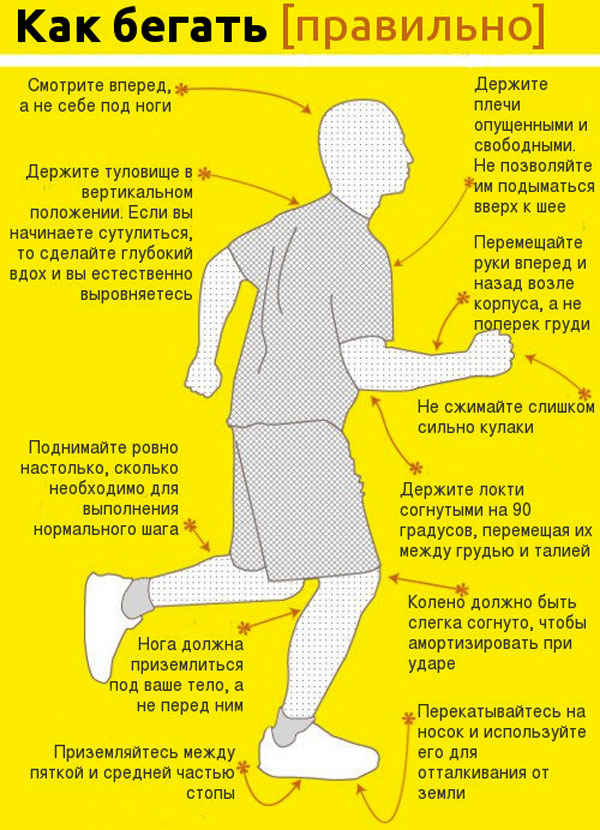 How to run
How to run Aerobic exercise during such physical activity can lead to a decrease in heart rate at rest by 5-25 beats per minute. Statistics show that a course of the above physical activities, alternating with each other, leads to a decrease in resting heart rate in 11% of patients.
Only walking does not affect the reduction in heart rate at rest - in the same volume as intense physical activity - although it reduces the time it takes for the rhythm to return to a normal level after physical exertion.
Often an increase in heart rate is associated with climbing stairs. This is especially true when carrying heavy loads. There is a useful step exercise, which consists in climbing onto a low bench, alternately using one or the other leg. This exercise can be done at home without any help. At the first stages, it will be necessary to control your pulse and not allow it to go beyond 110-115 beats per minute. As you train, the number of approaches will gradually increase, which will allow you to overcome a real staircase without shortness of breath and an increased heart rate.
The fight against excess weight
Another provocateur of increased stress on the heart muscle is overweight. With an excess of mass, the heart is forced to pump large volumes of blood to supply oxygen to all organs of the body. Having a limited volume, the heart increases the frequency of its contractions to ensure the normal functioning of the body. With a decrease in body weight, the heart load also decreases, since a smaller volume of blood is already required to ensure the normal functioning of the body.

